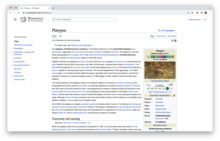Web page

Aweb page(orwebpage) is a document onthe Webthat is accessed in aweb browser.[1]Awebsitetypically consists of many web pageslinkedtogether under a commondomain name.The term "web page" is therefore a metaphor of paper pages bound together into a book.
Navigation
[edit]Each web page is identified by a distinctUniform Resource Locator(URL). When the user inputs a URL into theirweb browser,the browser retrieves the necessary content from aweb serverand thentransformsit into an interactive visual representation on the user's screen.[2]
If the userclicksortapsalink,the browser repeats this process to load the new URL, which could be part of the current website or a different one. The browser hasfeatures,such as theaddress bar,that indicate which page is displayed.
Elements
[edit]
A web page is astructured document.The core element is atext filewritten in theHyperText Markup Language(HTML). This specifies the content of the page,[3]includingimagesandvideo.
Cascading Style Sheets(CSS) specify thepresentationof the page.[3]CSS rules can be in separate text files or embedded within the HTML file.
The vast majority[4]of pages haveJavaScriptprograms,enabling awide rangeof behavior.[3]The newerWebAssemblylanguage can also be used as asupplement.[5]
The most sophisticated web pages, known asweb apps,combine these elements in acomplex manner.
Deployment
[edit]From the perspective ofserver-sidewebsite deployment, there are two types of web pages:staticanddynamic.Static pages are retrieved from the web server'sfile systemwithout any modification,[6]while dynamic pages must be created by the serveron the fly,typically reading from adatabaseto fill out atemplate,before being sent to the user's browser.[7]An example of a dynamic page is asearch engine results page.
See also
[edit]References
[edit]- ^"Web page – definition of web page by The Free Dictionary".Archivedfrom the original on 23 April 2021.Retrieved23 April2021.
- ^"Behind the scenes of modern web browsers".Tali Garsiel.Archivedfrom the original on 18 April 2018.Retrieved21 April2018.
- ^abcFlanagan, David (18 April 2011).JavaScript: the definitive guide.Beijing; Farnham: O'Reilly. p. 1.ISBN978-1-4493-9385-4.OCLC686709345.
JavaScript is part of the triad of technologies that all Web developers must learn: HTML to specify the content of web pages, CSS to specify the presentation of web pages, and JavaScript to specify the behavior of web pages.
- ^"Usage Statistics of JavaScript as Client-side Programming Language on Websites".W3Techs.Retrieved27 February2024.
- ^"The State of WebAssembly 2023".Scott Logic. 18 October 2023.Retrieved18 April2024.
- ^Melendez, Steven (10 August 2018)."The Difference Between Dynamic & Static Web Pages".Chron.Archived fromthe originalon 20 March 2019.Retrieved20 March2019.
Static by definition means something that does not change. The first pages on the World Wide Web were largely static and unchanged, delivering the same information about a particular topic to anyone who visited. In some cases, sites may evolve slightly over time but are still largely static, meaning that they only change when manually changed by their creators, not on a regular and automated basis.
- ^"Definition of: dynamic Web page".PC Magazine.Archived fromthe originalon 17 January 2017.Retrieved20 March2019.
A Web page that provides custom content for the user based on the results of a search or some other request.
